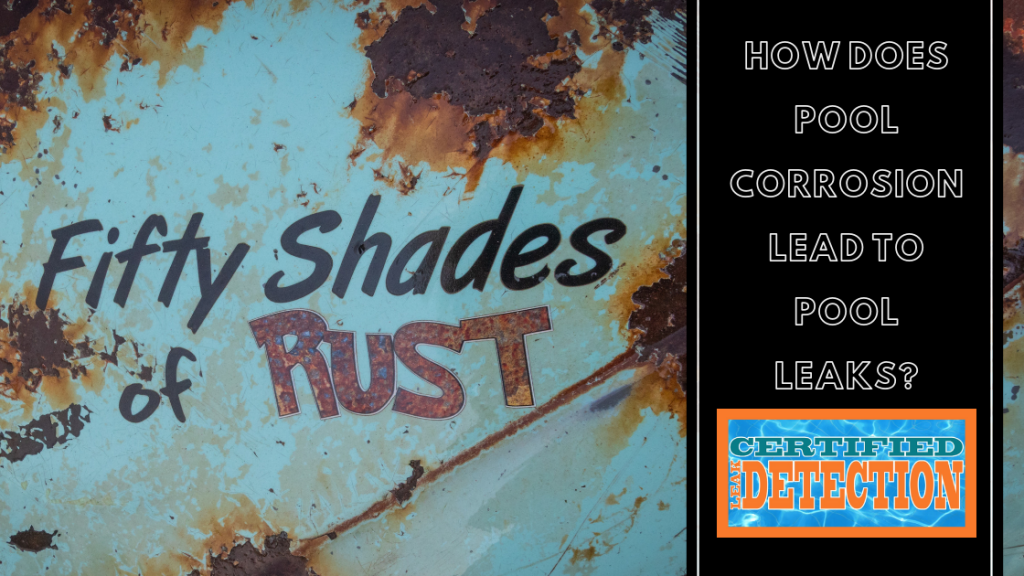Your Central Florida swimming pool is your family’s center of summer fun, but keeping it in perfect condition requires making a pool cleaning schedule and sticking to it. One of the daily pool maintenance tasks is to check the water level. Noticing an unusual decrease can indicate a leak. While a pool leak can have several causes, there’s one that most homeowners seldom consider – corrosion.
Yes, pool corrosion is known to cause pool leaks. Regardless of the size, be it a big leak or pinhole leak in a copper pipe – as covered in our October 2018 blog post – any type of leak will cause damage that becomes more extensive and expensive to repair the longer it goes undetected. Apart from causing structural damage, a leak can also result in higher water bills. To test for leaks, our DIY Test for Swimming Pool Leaks offers several methods, such as the bucket and evaporation test, and pool pump on-or-off leak test.
What causes rust in your swimming pool, and what to do about it
Several factors can cause damaging rust in your pool.
Home lifestyle website Hunker identifies the following possible culprits:
Oxidized iron – The water you use to fill your pool can contain metal. This is especially likely if you use well water. This issue will show up as tiny rusty spots in your pool. Add a metal-out additive to your pool water, and sweep and vacuum your pool more frequently. You can also acid wash the rusty spots or scrub them with a brush – as well as use magnets to pull them out.
Soluble and colloidal iron – Soluble iron is common in well water, and rusts when it comes into contact with air. This forms reddish brown particles in the water. To resolve, feed chemicals into the water to oxidize the iron, which can then be removed with a mechanical filter. You also can add chemicals that coat the iron so it will not receive oxygen. Colloidal iron also is rust that is in the water, but usually bound together with other substances. Either add chlorine to oxidize the iron from the other substances, or add polymers that will cause the iron to form larger clumps that can be filtered away.
Bacterial and organic bound – Living organisms cause an iron bacterial problem. These organisms feed on iron that is found in water, and develop slime along the path of the water. It will appear rust (brown) or green. Use high amounts of chlorination in your plumbing to kill it. An organic bound pool occurs when tannins and other organics combine with iron. Test for the presence of tannins. If present, add chlorine and use a carbon filter to remove it. Replace the carbon bed when saturated.
Rebar and concrete rust – The intersecting metal shafts under the plaster of the pool are called rebar. Rebar can rust if placed within an inch of the surface. Sometimes there are traces of iron in the concrete mix in pool construction, which also can cause corrosion. If ignored, rust will eventually spread, resulting in costly repair. When the problem remains untreated for a long time, rust can spread throughout the pool leading to costly repairs. The Hunker article offers instructions for a DIY repair, but in our opinion, this type of job is better left to the pros.
Metallic items – Dropping metallic items – such as a nail – into the pool can also cause rust stains. Should these occur, clean with a steel brush or rust-removing cleaner, which is available in pool supply stores. Hopefully, however, you quickly discover and retrieve such items by following your pool maintenance schedule.
Corrosion in above-ground swimming pools
Above-ground pools can experience rust and corrosion, but the circumstances are different from those involving in-ground pools. Although the types of pool leaks Certified Leak Detection handles occurs only in in-ground pools, we want to provide some advice that may be useful to above-ground pool owners. We admit an ulterior motive. You may one day be in need of our services in other areas of your property – such as a sewer leak or slab leak – and we’d like you to keep us in mind!
The experts at swimming pool supply house INYOPools offer two excellent articles on the subject of rust in above-ground pools – one of which covers why some pools get rusty; the other provides detailed instructions on how to repair the damage.
No matter what causes a leak in your swimming pool, swimming pool deck, spa, fountain, sewer pipe or under concrete slabs or in underground plumbing, our experienced team of professionals at Certified Leak Detection are ready to help! Contact us today!

